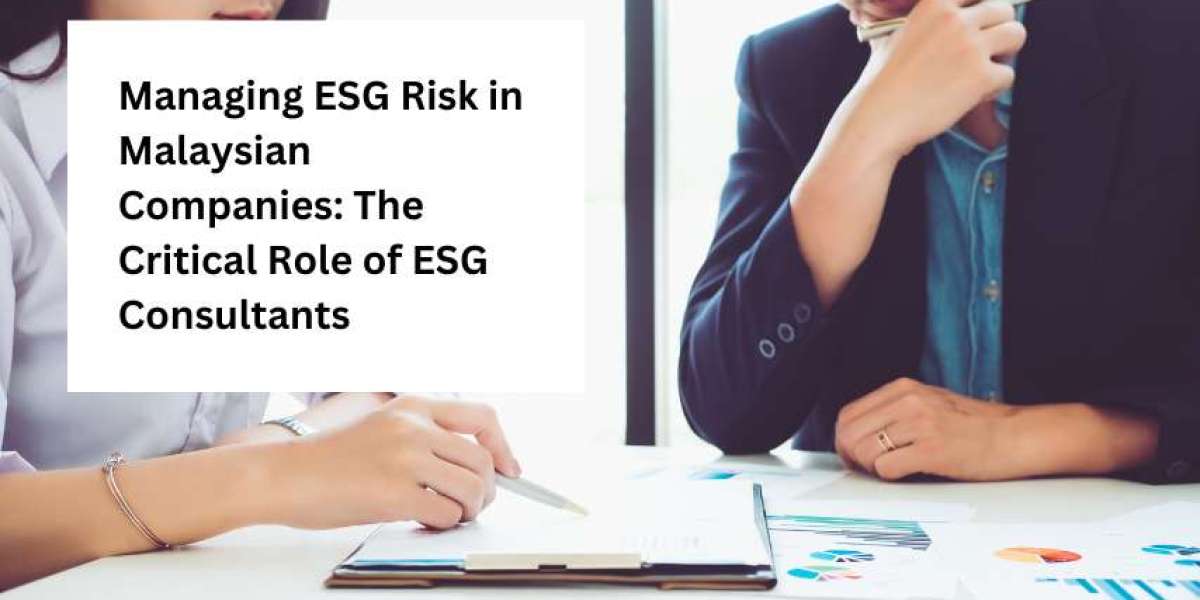Sustainability and corporate responsibility have emerged as defining priorities for businesses worldwide, including in Malaysia. Environmental, Social, and Governance (ESG) factors are no longer optional for companies—they play a critical role in shaping long-term success and resilience. However, ESG-related challenges come with unique risks that, if left unmanaged, can severely impact businesses. This is where ESG consultants step in as essential allies.
This article explores the significance of ESG considerations in Malaysia, the specific risks linked to neglecting these factors, and how ESG consultants help businesses address these challenges effectively.
The Growing Importance of ESG in Malaysian Businesses
Globally, the focus on ESG has intensified, with governments, investors, and consumers demanding greater accountability from corporations. Malaysia is no exception. The Malaysian Code on Corporate Governance and initiatives like the Sustainability Action Values for Enterprise (SAVE) by Bursa Malaysia underline the increasing regulatory focus on ESG.
Why ESG Matters to Malaysian Companies
1. Global Competitiveness
Companies positioned as ESG leaders attract international investors and partnerships. Failing to integrate ESG considerations can place Malaysian firms at a competitive disadvantage in the global market.
2. Risk Mitigation
Neglecting ESG exposes organizations to reputational, operational, and financial risks. For instance, not addressing labor rights violations may result in heavy penalties and a damaged reputation.
3. Access to Capital
Both institutional investors and lenders increasingly prioritize ESG performance. Companies with poor ESG practices may face higher borrowing costs or limited access to funding.
4. Regulatory Compliance
Malaysia continues to enforce stricter compliance standards related to sustainability. Companies that pro-actively align with ESG mandates can avoid legal repercussions.
ESG as a Moral and Strategic Imperative
Beyond regulatory obligations, adopting ESG practices aligns with Malaysia’s broader vision of becoming a sustainable and competitive economy. For companies, this is not just a matter of compliance but an avenue to innovate, attract talent, and build trust in local and global markets.
ESG Risks in the Malaysian Context
The risks associated with ignoring ESG considerations are significant—ranging from environmental violations to governance failures. Several of these risks are particularly acute for Malaysian companies, given the country’s socio-economic and environmental landscape.
1. Environmental Degradation
Malaysia faces numerous environmental challenges, including deforestation, pollution, and climate change-related risks. A dependency on natural resource extraction industries, such as palm oil and mining, has led to severe ecological impacts.
Example
The palm oil industry, a vital contributor to Malaysia’s economy, is at the center of sustainability debates. Improper land-use practices and deforestation have tarnished the sector’s global image, negatively affecting exports and investor confidence. Businesses that fail to adopt environmentally sustainable practices risk alienating major markets, such as the European Union, which prioritizes eco-friendly products.
2. Social Issues and Labor Rights
Malaysia is often under international scrutiny for labor rights violations, especially within manufacturing and plantation sectors. Poor working conditions, allegations of forced labor, and inadequate worker protections remain pressing concerns.
Example
The U.S. Customs and Border Protection banned imports from some Malaysian companies due to forced labor allegations. For affected firms, such bans not only lead to massive financial losses but also harm their reputation. Addressing these social risks is non-negotiable for businesses aiming for long-term growth.
3. Governance Challenges
Weak corporate governance exposes companies to financial irregularities, fraud, and public scandals. Malaysian companies operating without robust governance frameworks risk regulatory fines and loss of market trust.
Example
Recent high-profile cases in Malaysia, such as financial scandals involving government-linked entities, have underscored the need for transparent governance structures. Firms without clear accountability measures face reputational and operational setbacks, impacting shareholder value.
The Role of ESG Consultants in Managing Risks and Driving Strategy
Given the multifaceted nature of ESG challenges, businesses often lack the internal expertise or bandwidth to address these issues adequately. Expert ESG consultancies like Wellkinetics play a pivotal role in bridging this gap. They provide specialized knowledge and actionable strategies to help organizations achieve their sustainability goals while mitigating associated risks.
1. Comprehensive Risk Assessment
Successful ESG management begins with identifying and quantifying risks. Consultants conduct robust assessments to evaluate a company’s environmental footprint, social impact, and governance vulnerabilities.
How it Helps
By pinpointing critical risk areas—e.g., carbon emissions in manufacturing processes or labor discrepancies—consultants enable companies to develop targeted action plans. For instance, consultants may help a mining firm project its environmental liabilities over the next 10 years, allowing the company to address compliance gaps proactively.
2. Ensuring Regulatory Compliance
Malaysia continues to tighten its ESG-related compliance requirements. Consultants stay updated on evolving laws and global standards, ensuring that businesses remain in full compliance.
Value for Businesses
Navigating regulatory landscapes can be overwhelming. ESG consultants ensure adherence to local requirements, such as Bursa Malaysia’s Sustainability Reporting Guidelines, and international norms like the United Nations’ Sustainable Development Goals (SDGs). Compliance not only mitigates legal risks but also improves credibility with stakeholders.
3. Strategy Development and Implementation
A company’s ESG strategy must align with its overall business objectives. ESG consultants craft bespoke strategies that balance sustainability goals with profitability.
Example
A Malaysian manufacturing firm aiming to optimize energy efficiency might partner with consultants to develop a renewable energy roadmap. By implementing solar energy solutions, the company not only reduces costs but also fulfills its environmental commitments.
4. Performance Measurement and Reporting
Transparent reporting is a hallmark of strong ESG performance. Stakeholders—investors, customers, and regulators—demand reliable data to evaluate a company’s sustainability initiatives.
How Consultants Add Value
ESG consultants streamline the complex process of data collection, analysis, and reporting. They help companies produce comprehensive sustainability reports, enhancing transparency and stakeholder trust. Examples include aligning reports with frameworks like the Global Reporting Initiative (GRI) for credibility.
5. Stakeholder Engagement
Managing ESG risks involves engaging and collaborating with stakeholders, including employees, investors, local communities, and regulators.
Insight
ESG consultants facilitate stakeholder dialogues, identifying shared goals and addressing concerns effectively. For example, consultants might mediate discussions between plantation companies and local communities to foster sustainable land-use practices.
The Benefits of Proactive ESG Management
Companies that integrate ESG at the core of their operations unlock a range of benefits, including:
1. Enhanced Reputation and Trust
Proactive management showcases a company’s commitment to responsible business practices, elevating its brand image. Trustworthy businesses attract loyal customers and socially conscious investors, creating a positive cycle of growth.
2. Competitive Differentiation
Firms with strong ESG credentials distinguish themselves in the marketplace. Whether bidding for government contracts or entering new global markets, an ESG-first approach often provides the competitive edge.
3. Long-Term Cost Savings
Sustainability initiatives, such as energy efficiency improvements or waste reduction programs, generally lead to significant cost reductions. For instance, renewable energy adoption in manufacturing lowers energy expenses while reducing carbon footprint.
4. Better Risk Management
Proactively addressing ESG risks ensures businesses are equipped to handle unfavorable scenarios, such as regulatory crackdowns or natural disasters. This preparedness minimizes disruptions and financial losses.
5. Employee Satisfaction and Talent Retention
Millennials and Gen Z workers, who place significant emphasis on ethical and environmental concerns, prefer working for companies with strong ESG commitments. Better ESG performance translates into higher employee satisfaction and reduced turnover.
Examples of Malaysian Companies Demonstrating ESG Leadership
Numerous Malaysian firms have made strides in integrating ESG considerations. For instance:
- Top Glove Corporation has implemented various sustainability measures to reduce environmental impact and improve employee welfare.
- SP Setia Berhad, a prominent real estate developer, incorporates green building techniques in its projects to promote sustainable living.
- Petronas, Malaysia’s oil and gas giant, has committed to achieving net-zero carbon emissions by 2050, setting an example for the energy sector.
Such examples highlight the possibilities when ESG is embedded into the heart of corporate strategy.
Final Thoughts
Managing ESG risks is no longer a luxury for Malaysian companies—it’s a strategic necessity. With heightened regulatory scrutiny, increasing societal expectations, and rising investor demand for transparency, businesses that fail to address ESG risks will find themselves at a disadvantage.
Best ESG consultants in Malaysia play a critical role in this transformation, offering expertise in risk assessment, regulatory compliance, and strategic implementation. Their value extends beyond traditional consulting—empowering businesses to lead with integrity, innovate responsibly, and build sustainable legacies.
By embedding ESG in their core operations, Malaysian companies secure their future while contributing to the broader sustainability goals of the nation. The question is no longer whether to act on ESG, but how quickly and decisively action is taken.














